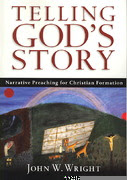Book Review: Telling God's Story (Wright)
Telling God's Story: Narrative Preaching for Christian Formation by John W. Wright
My rating: 5 of 5 stars
View all my reviews
My rating: 5 of 5 stars
The state of the American pulpit is in crisis. Furthermore, the foundational narrative of the American church, in which the pulpit arises out of, is also in crisis. As in the words of John Wright, the Biblical narrative of the church has been “Eclipsed” by an Americanized Christian narrative.
Wright discusses the eclipse of the Biblical narrative by taking the reader all the way back to the Puritan pulpit where the message of salvation, that once was framed within the context of creation, shifted to the framework of the individual. This seismic shift resulted in God shifting from the central actor in the Biblical narrative to the individual becoming the story’s central actor. God become a supporting actor for our individualized narrative of salvation. According to Wright, “Instead of God’s story of the redemption of all creation, the Bible was narrowed to the story of personal salvation.” Thus the cult of individualism arose in the Christian narrative of the church.
Furthermore, Wright discusses the eclipse of the Biblical narrative in the advent of a Federal Covenant narrative where Christianity was democratized. This eclipse also narrowed the Biblical story by making the United States God’s elect nation. The Biblical narrative was then used to motivate the nation morally and materially. This connection of Christianity with patriotism ended up displacing and emptying the church from its place in the Biblical narrative as the elect people of God. Wright rightly summarizes this by saying that it was and is a de-ecclesializing of the church.
Obviously, Wright’s argument and persuasive plea is for the pastor, pulpit and church to return to a Biblical narrative. Unfortunately many pastors are entrenched in comedic preaching[1] rather than preaching that is characterized by tragedy.[2] The downfall of comedic preaching is that it will never confront or challenge the eclipsed and misguided narrative of the American Church. Wright states that Comedic Preaching, “Never challenges the deepest convictions, the most profound narratives, of the hearer. Comedic preaching never confronts the possibility of a different narrative…” Essentially comedic preaching allows the Biblical text to be transformed, not the hearer. Before a pastor can confront the eclipsed narrative in the church the pastor needs to shift to tragedy preaching. Keep in mind though… as pastors engage the church with tragedy preaching, this methodology of preaching does not come without cost. An uprooting of an ingrained individualistic and democratized narrative in the church will definitely result in what Wright calls an, “Epistemological Crisis.”
Epistemology is simply the study of what we know and how we know it. A church that has been deriving and basing its beliefs from a worldly narrative (i.e. worldly epistemology), such as the Individualistic and Federal Covenant narrative, will experience a belief (i.e. epistemology) crisis as Biblical tragedy preaching confronts and exposes ill-informed and false presuppositions. This epistemology crisis is painful and occurs when a person in the pew recognizes that their narrative account is no longer adequate to process the newly heard Biblical narrative. Wright states, “The pain of an epistemological crisis, while ultimately helpful, initially sends shock waves through individuals and congregations. Will the congregation wait it out, making it through destruction of their horizon to see anew another day? Or will they receive the biblical text as a violation of their horizon, seal themselves off, never to return to the sanctuary again?”
In summary, Wright concludes the book with several suggestions and examples of how the pulpit, as the central instrument of formation for the church, can gently bring about a shift back to a Biblical narrative. Wright’s book is of the utmost importance in our time as many pastors and churches attempt to bring back a needed shift in the pulpit and life of the church.
[1] Comedic Preaching: seeks to have a comedic/happy end—not through providing humor but through granting a nice pleasant bow on the end of the sermon; all is well! Misinformed narratives of the church are not challenged rather the gospel is simply added as a nice finality to a faulty narrative.
[2] Tragedy Preaching: seeks to expose, dislodge and destroy false presupposition. Tragedy preaching reveals the weakness and failures of the audience’s current misinformed narrative. It destroys the false narrative so as to open the door for a new narrative (i.e. the Biblical narrative).
View all my reviews
